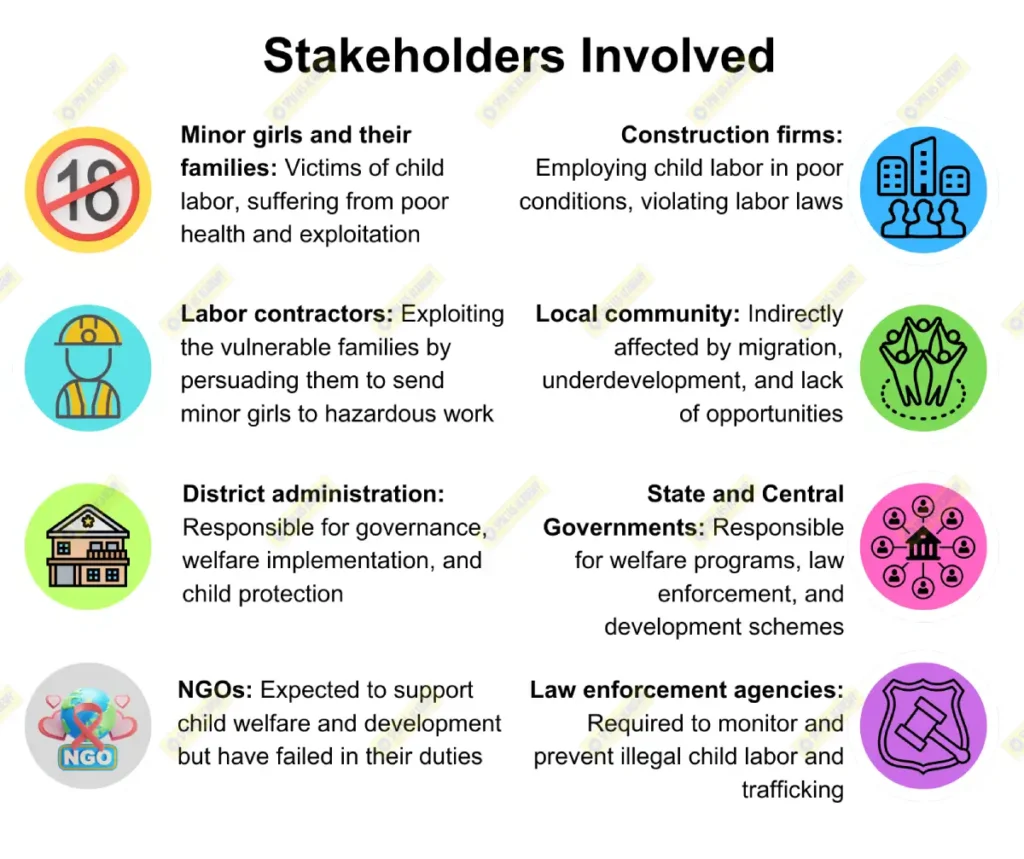The above case study pertains to the intersectionality of child labor, economic underdevelopment, and governance failures in Moloypur, a remote tribal district. The situation reflects the complex interplay of social, economic, and administrative issues that require immediate attention to ensure both the protection of vulnerable groups and the long-term development of the district.

Ethical Issues Involved
- Exploitation of Child Labor: The use of minor girls in hazardous construction work is a clear violation of their rights and the Child Labour (Prohibition and Regulation) Act, 1986. The coercion by labor contractors exacerbates this exploitation.
- Neglect of Tribal Welfare: The inadequacy of welfare programs points to the systemic neglect of tribal populations, violating their right to equal access to development and government schemes.
- Health and Safety Concerns: Unhygienic living conditions at construction sites lead to serious health issues for the girls, infringing upon their basic human rights to safety, health, and dignity.
- Accountability and Corruption: The compromised role of NGOs and construction firms in overlooking child labor and the failure of welfare programs reflect issues of corruption, lack of accountability, and weak governance.
Steps to Ameliorate Conditions of Minor Girls and Improve the District’s Economic Scenario
1. Immediate Rescue and Rehabilitation of Minor Girls
- Rescue Operations: Collaborate with law enforcement and child protection agencies to identify and rescue the minor girls working in hazardous conditions.
- Rehabilitation Programs: Set up vocational training centers and ensure enrollment of the rescued girls in local schools under the Right to Education (RTE) Act. Offer skill development and health check-ups through government schemes like Kishori Shakti Yojana.
2. Strengthening Welfare Program Implementation
- Targeted Scheme Monitoring: Initiate audits and public monitoring of welfare schemes like MGNREGA and Tribal Sub-Plan to ensure that they are reaching the tribal population effectively.
- NGO Accountability: Hold NGOs accountable by setting up third-party audits and forming local committees to track their work and ensure transparency in their operations.
3. Economic Development Initiatives
- Agricultural Modernization: Introduce sustainable agricultural practices like organic farming, crop diversification, and better irrigation techniques. Collaborate with Krishi Vigyan Kendras (KVKs) to provide agricultural training and support to farmers.
- Small-Scale Industry Development: Promote small-scale industries like food processing and handicrafts using tribal skills. Set up cooperative societies to enhance income generation.
- Government-Industry Partnerships: Encourage public-private partnerships (PPPs) to attract investment in environmentally sustainable industries such as agro-processing and eco-tourism in the region.

4. Child Protection and Community Awareness
- Community Awareness Programs: Organize awareness campaigns in collaboration with local leaders, schools, and NGOs to educate parents about child rights, legal frameworks, and the dangers of child labor.
- Legal Action Against Exploitative Labor Contractors: Launch strict enforcement against labor contractors violating child labor laws, ensuring legal consequences for their actions.
5. Long-Term Economic Planning
- Improved Educational Infrastructure: Focus on building schools and improving educational infrastructure in the district through central schemes like Sarva Shiksha Abhiyan.
- Infrastructure Development: Push for improved road connectivity, drinking water supply, and electrification under government programs such as Pradhan Mantri Gram Sadak Yojana (PMGSY) and Deen Dayal Upadhyaya Gram Jyoti Yojana to attract economic activity.
As District Commissioner, the focus should be on rescuing and rehabilitating minor girls while addressing the broader socio-economic issues through targeted welfare delivery, economic development initiatives, and strengthening of local governance; in line with the ideals of Tribal Panchsheel. A sustainable and inclusive approach is essential for the holistic development of Moloypur.
Check out UPSC Coaching Centre Guwahati | APSC Coaching Centre Guwahati | Crack APSC Exam | UPSC Civil Services Exam | Ethics Paper in UPSC Exams












